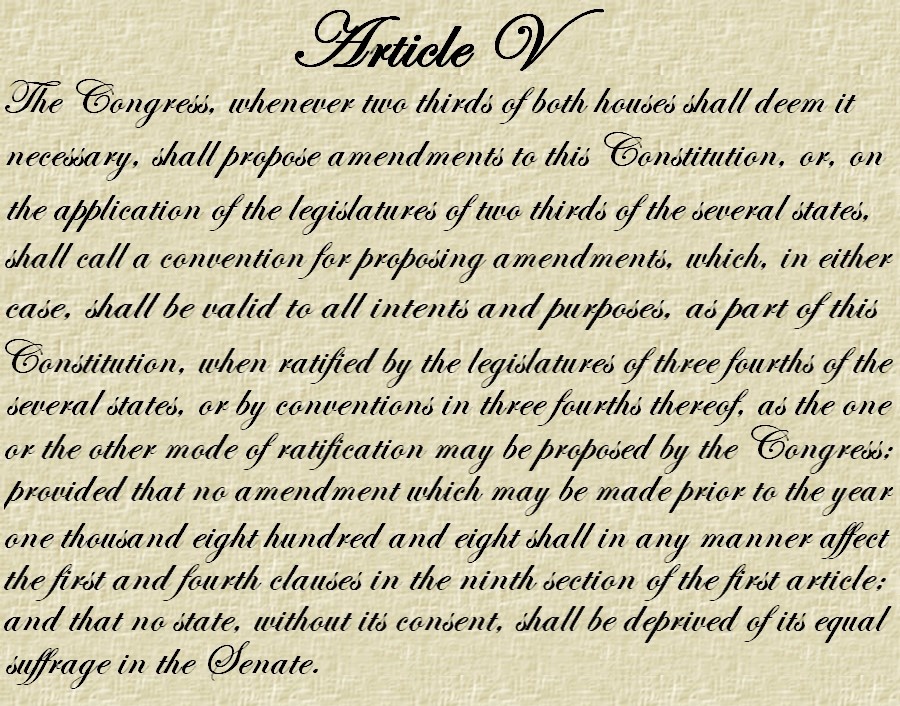Five Constitutional Amendment Efforts to Watch in 2020 –
by Stuart MacPhail January 2020
As 2020 state legislative sessions are ready to start, five efforts are underway to bring about amendments to the US Constitution.
- Convention of States Project (CoSP): (14 state resolutions already adopted)
In Pennsylvania House Resolution 206 (the CoSP triple-subject proposal) has 8 sponsors, and was passed out of the House State Government Committee in mid-December. Companion bill SR234 has 7 sponsors in the Senate. The Pennsylvania Capitol-Star had an opinion piece about the effort with these strange observations: “The resolution calls for ‘fiscal restraint,’ and that might mean giving the courts the power to hold down federal spending… and But it could also mean giving them [the Article V convention] the power to balance the federal budget by raising taxes much higher than they are today”. Read their opinion HERE.
The South Carolina legislature is considering the CoSP proposal as H3125, which has 30 sponsors, and S112 with 19 sponsors. Both bills are in the respective chamber’s Judiciary Committees. The effort is supported by three SC congressmen, William Timmons, Jeff Duncan and Ralph Norman. The South Carolina Libertarian Party is also supporting the proposed resolution.
Reportedly Congressman Timmons said, “From rampant federal spending that has created $23 trillion in national debt to career politicians that put their political interests before the people they represent, our government is clearly in crisis… and The convention of states promises to be the solution that the founders envisioned when drafting our constitution in 1787”.
In Wisconsin the CoSP bill (SJR57) has 6 Senate sponsors and 27 House sponsors. The bill, introduced in August, was assigned to a committee where it has yet to be acted on.
The CoSP proposed resolution was introduced in Massachusetts last January with 7 sponsors. It has yet to see any action.
- Federal Fiscal Responsibility/BBA Effort (27 state resolutions adopted)
The single-issue movements aiming for federal fiscal responsibility or balanced budget amendments showed no significant progress during 2019. The BBA Task Force, the Center for State-led National Debt Solutions, and Let Us Vote for a BBA have also not shown themselves to be particularly organized for the new year.
There are two exceptions. In South Carolina S125 (with 8 sponsors) and H3017 (with 14 sponsors) seek a BBA-only resolution. There is an effort to get Mississippi to amend HCR51 which was adopted in 1975. That was a resolution calling for an Article V convention to propose a BBA-like constitutional amendment. Unfortunately, that resolution had so many specifications that Article V scholars do not believe it can be aggregated with the other existing BBA-focused applications. So far 27 states have adopted BBA-focused single-subject convention calls.
- US Term Limits (USTL): (3 single-subject state resolutions adopted)
In addition to the above Article V-related legislative proposals, South Carolina is also considering the stand-alone US Term Limits resolution (S663). The bill has 10 sponsors. Companion bill H3166 has 15 sponsors. No new states adopted the USTL resolution in 2019, but the group has been successful in gaining pledges of legislative support going into the 2020 legislative session.
- Equal Rights Amendment (ERA):
Proponents for the Equal Rights Amendment, led by the ERA Coalition think 2020 will be their year to get the 1972 Congress-proposed ERA formally added to the US Constitution. According to the Los Alamos (NM) Daily Post, that state’s US Senator Tom Udall joined 19 of his Senate colleagues in supporting a bipartisan resolution (HJRes 79) that “would remove a 1982 deadline for ratification of the ERA, thereby paving the way for full and equal protections for women under the Constitution”. The effort is being made in anticipation of Virginia becoming the 38th state to ratify the measure. Read the story HERE.
Meanwhile constitutional amendment ratification expert Gregory Watson wrote a commentary published on December 9 by the Texas Scorecard that gives a good historical overview of the ERA movement, and offers warnings to state legislators about several implications of the belated effort to ratify the ERA.
Watson points out that unlike the original ERA drafted in 1923 by suffragists Alice Paul and Crystal Eastman, the wording of the 1972 proposal does not refer to equal rights for “men and women”, but rather that: “Equality of rights under the law shall not be denied or abridged by the United States or by any State on account of sex”. (NOTE: on Nov. 13, 2019 House Judiciary Chairman Nadler announced: “And make no mistake, the ERA’s prohibition of the denial or abridgment of ‘equality of rights under the law … on account of sex’ includes discrimination based on sexual orientation and gender identity.”)
The entire Watson piece is worthy of a full and thoughtful read by both legislators and the general public. Read it HERE.
Mr. Watson also draws attention to an ERA-related lawsuit brought by Alabama, Louisiana and South Dakota seeking a court order directing the Archivist of the United States to honor the original congressional deadline and the five existing state rescissions as valid and enforceable. A newspaper story about that suit is HERE, and a copy of the actual filing is HERE. On December the office of the National Archives and Records Administration issued a brief news release in response to the suit. See it HERE.
- Campaign Finance Reform (5 similar state resolutions already adopted)
Variations of the WolfPAC-promoted resolution to restrict campaign financing are being considered: In Pennsylvania SR192 with 20 sponsors, introduced in August and HR457 with 32 sponsors, introduced in September. South Carolina SR192, introduced last January. And, Massachusetts H3208 with 82 sponsors, and S2163, with 24 sponsors, was introduced last January.
On December 18 The Fulcrum carried an opinion piece by Mike Monetta, the national director of WolfPAC wherein he described the WolfPAC effort. Read it HERE.

